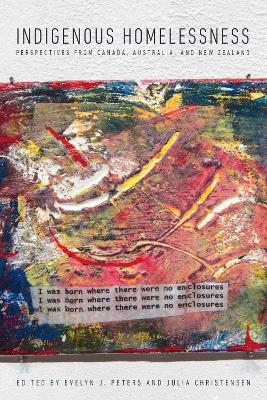
Indigenous Homelessness
Perspectives from Canada, Australia, and New Zealand
Seiten
2016
University of Manitoba Press (Verlag)
978-0-88755-826-9 (ISBN)
University of Manitoba Press (Verlag)
978-0-88755-826-9 (ISBN)
Explores the meaning and scope of indigenous homelessness in the Canada, Australia, and New Zealand. They argue that effective policy and support programs aimed at relieving indigenous homelessness must be rooted in indigenous conceptions of home, land, and kinship, and cannot ignore the context of systemic inequality, institutionalization and landlessness that stem from a history of colonialism.
Being homeless in one’s homeland is a colonial legacy for many indigenous people in settler societies. the construction of commonwealth nation-states from colonial settler societies depended on the dispossession of indigenous peoples from their lands. the legacy of that dispossession and related attempts at assimilation that disrupted indigenous practices, languages, and cultures—including patterns of housing and land use—can be seen today in the disproportionate number of indigenous people affected by homelessness in both rural and urban settings.
Essays in this collection explore the meaning and scope of indigenous homelessness in the canada, australia, and new Zealand. they argue that effective policy and support programs aimed at relieving indigenous homelessness must be rooted in indigenous conceptions of home, land, and kinship, and cannot ignore the context of systemic inequality, institutionalization, landlessness, among other things, that stem from a history of colonialism.
Indigenous Homelessness: Perspectives from Canada, New Zealand and Australia provides a comprehensive exploration of the indigenous experience of homelessness. it testifies to ongoing cultural resilience and lays the groundwork for practices and policies designed to better address the conditions that lead to homelessness among indigenous peoples.
Being homeless in one’s homeland is a colonial legacy for many indigenous people in settler societies. the construction of commonwealth nation-states from colonial settler societies depended on the dispossession of indigenous peoples from their lands. the legacy of that dispossession and related attempts at assimilation that disrupted indigenous practices, languages, and cultures—including patterns of housing and land use—can be seen today in the disproportionate number of indigenous people affected by homelessness in both rural and urban settings.
Essays in this collection explore the meaning and scope of indigenous homelessness in the canada, australia, and new Zealand. they argue that effective policy and support programs aimed at relieving indigenous homelessness must be rooted in indigenous conceptions of home, land, and kinship, and cannot ignore the context of systemic inequality, institutionalization, landlessness, among other things, that stem from a history of colonialism.
Indigenous Homelessness: Perspectives from Canada, New Zealand and Australia provides a comprehensive exploration of the indigenous experience of homelessness. it testifies to ongoing cultural resilience and lays the groundwork for practices and policies designed to better address the conditions that lead to homelessness among indigenous peoples.
Evelyn Peters is an urban social geographer with a research focus on urban First nations and métis. Julia christensen is a social, cultural and health geographer, and works primarily with northern indigenous communities in canada and greenland.
| Erscheinungsdatum | 03.12.2016 |
|---|---|
| Zusatzinfo | 27 black & white illustrations, 11 tables |
| Verlagsort | Winnipeg |
| Sprache | englisch |
| Maße | 152 x 229 mm |
| Gewicht | 615 g |
| Themenwelt | Geisteswissenschaften ► Geschichte ► Regional- / Ländergeschichte |
| Sozialwissenschaften ► Ethnologie ► Volkskunde | |
| Sozialwissenschaften ► Soziologie | |
| ISBN-10 | 0-88755-826-7 / 0887558267 |
| ISBN-13 | 978-0-88755-826-9 / 9780887558269 |
| Zustand | Neuware |
| Haben Sie eine Frage zum Produkt? |
Mehr entdecken
aus dem Bereich
aus dem Bereich


